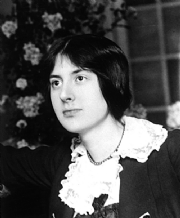Lili Boulanger
Marie-Juliette Boulanger (21 August 1893 – 15 March 1918), professionally known as Lili Boulanger was a French composer and musician who was the first female winner of the Grand Prix de Rome composition prize. Her older sister was the noted composer and composition teacher Nadia Boulanger; their father was the composer Ernest Boulanger.
Born in the 9th arrondissement of Paris, Boulanger's prodigiousness was apparent at a very young age: at two, she was already singing melodies by ear and learnt how to read sheet music before the alphabet. Her parents, both musicians, encouraged their daughter's musical education: her mother, Raissa Myshetskaya (Mischetzky) (1858–1935), was a Russian princess (born in Saint Petersburg) who married her vocal teacher at the Conservatoire de Paris, Ernest Boulanger, who won the Prix de Rome in 1835. Ernest Boulanger was 77 years old when she was born and she became very attached to him. Her paternal grandfather Frédéric Boulanger had been a noted cellist; her grandmother, Marie-Julie Halligner, was a famous mezzo-soprano.
Boulanger often accompanied her ten-year-old sister Nadia to classes at the Paris Conservatoire, shortly thereafter auditing classes on music theory and studying organ with Louis Vierne. She also sang and played piano, violin, cello and harp. Her teachers included Marcel Tournier and Alphonse Hasselmans for harp, Hélène Chaumont (mother of Madeleine Chaumont) for piano and Fernand Luquin for violin. However, Lili herself was barred from working on her musical studies due to pneumonia lasting from the ages of six through sixteen. After much waiting, Boulanger embarked to study harmony with Georges Caussade and composition with Paul Vidal at the Conservatoire de Paris. Whilst she studied under numerous noted pedagogues at the institution, she was primarily backed by one devoted supporter—her sister Nadia.
Boulanger suffered from chronic illness: at two, she was infected with bronchial pneumonia, weakening her immune system; it would eventually lead to the intestinal tuberculosis that would kill her at 24. Although fond of travelling (and having completed several works in Italy after winning the Prix de Rome) her failing health forced her to return home: there, she and her sister organised efforts to support French soldiers during World War I. Her last years were musically productive: she laboured to complete various works. Her death left the opera La princesse Maleine, on which she had spent most of her last years, unfinished.
She died in Mézy-sur-Seine on 15 March 1918; afterwards, she was buried in a tomb at the Montmartre Cemetery. Nadia was buried alongside her in 1979; the sisters lie next to their parents.














 My Wish List
My Wish List















